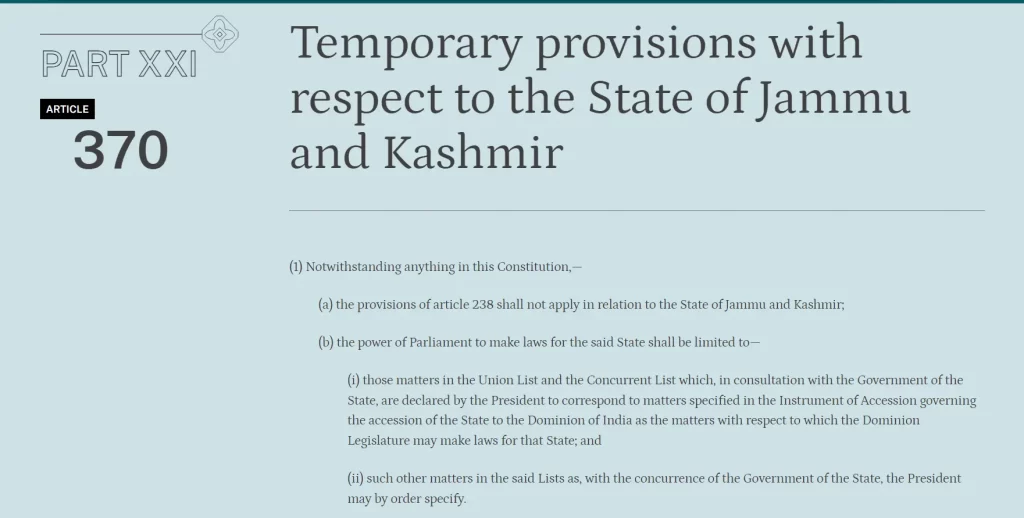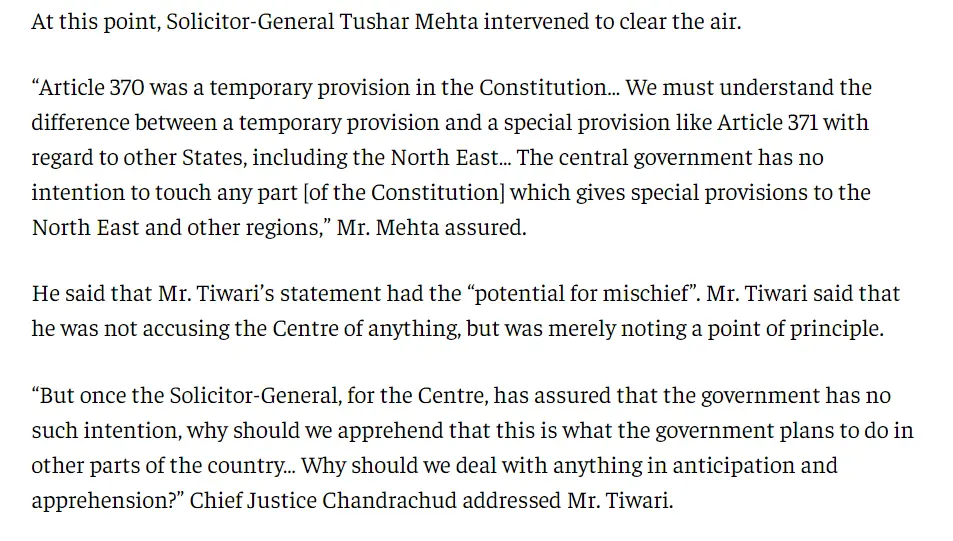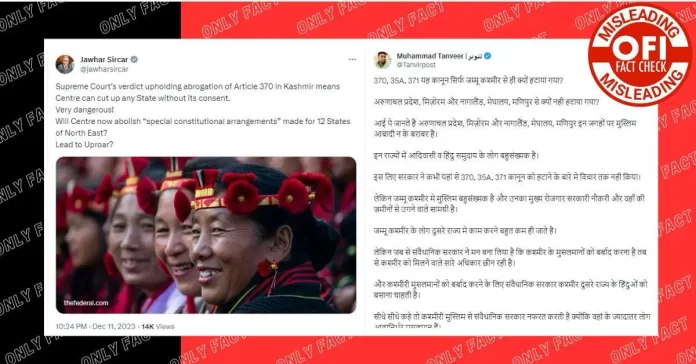On the pivotal date of December 11th, a Supreme Court bench, led by Chief Justice D Y Chandrachud, affirmed the Indian government’s consequential choice to nullify Article 370 in the state of Jammu and Kashmir on August 5, 2019. This momentous ruling reverberated like seismic waves, causing profound disquiet within the spheres of both the communist and Islamist factions. On this significant day in 2023, a dual disillusionment befell the left-liberal contingent, as not only did their aspirations for renewed unrest in Jammu and Kashmir remain unrealized, but also their expectations for Chief Justice Chandrachud to align with their agenda proved to be in vain.
Following this momentous verdict, dissent emanated from the ranks of Islamists, Communists, and the Congress party, each expressing their disagreement and discontent with the Supreme Court’s decision. Nonetheless, a subset within this dissenting cohort asserted a more contentious narrative, claiming that the revocation of Article 370 in Jammu and Kashmir was done because the Muslim community are in majority in J&K.
Radical Islamist Muhammad Tanvir claimed on X, “Why was this law 370, 35A, 371 removed only from Jammu and Kashmir?
Why was it not removed from Arunachal Pradesh, Mizoram and Nagaland, Meghalaya, Manipur?
Let us know that the Muslim population in these places Arunachal Pradesh, Mizoram and Nagaland, Meghalaya, Manipur is negligible.
People from tribal and Hindu communities are in majority in these states.
That is why the government never even thought about removing laws 370, 35A, 371 from here.”
370, 35A, 371 यह कानून सिर्फ जम्मू कश्मीर से ही क्यों हटाया गया?
— Muhammad Tanveer | تنوير (@Tanvirpost) December 12, 2023
अरुणाचल प्रदेश, मिज़ोरम और नागालैंड, मेघालय, मणिपुर से क्यों नही हटाया गया?
आई ये जानते है अरुणाचल प्रदेश, मिज़ोरम और नागालैंड, मेघालय, मणिपुर इन जगहों पर मुस्लिम आबादी न के बराबर है।
इन राज्यों में आदिवासी व… pic.twitter.com/WgAMj7AZwp
TMC Rajya Sabha Member of Parliament Jawahar Sircar tweeted, “Supreme Court’s verdict upholding abrogation of Article 370 in Kashmir means Centre can cut up any State without its consent. Very dangerous! Will Centre now abolish “special constitutional arrangements” made for 12 States of North East? Lead to Uproar?”
Supreme Court’s verdict upholding abrogation of Article 370 in Kashmir means Centre can cut up any State without its consent.
— Jawhar Sircar (@jawharsircar) December 11, 2023
Very dangerous!
Will Centre now abolish “special constitutional arrangements” made for 12 States of North East?
Lead to Uproar? https://t.co/pWuykWtgOa
In the course of this article, our focus will be on fact-checking Muhammad Tanvir’s assertion that Article 370 was exclusively revoked in Jammu and Kashmir, while persisting as law in the North-eastern states. Our endeavour is to rigorously examine and authenticate the accuracy of this claim, delving into the intricate details surrounding the constitutional landscape and dispelling any potential misinformation.
Fact Check
We will start by giving a brief understanding of the article 370. Article 370 of the Indian Constitution granted special status to Jammu and Kashmir, a region in the northern part of the Indian subcontinent that has been a point of contention among India, Pakistan, and China since 1947. From November 17, 1952, to October 31, 2019, Jammu and Kashmir functioned as a state with Article 370 providing it the authority for a separate constitution, a state flag, and self-governance.
This article was part of the Temporary Provisions (Part XXI) of the Indian Constitution. It outlined that the Constituent Assembly of Jammu and Kashmir could decide how much of the Indian Constitution would be applicable to the state. The state assembly also had the option to completely remove Article 370, leading to the full application of the Indian Constitution in the state.

Evidently, Article 370 was designed as a temporary provision. Regrettably, the Congress government, under the influence of various members of the Gandhi family and in collaboration with the Abdullahs and Muftis, exploited Article 370 to such an extent that it transformed into a shield for fostering terrorism and widespread corruption.
The definition further clarifies that Article 370 was specifically bestowed upon the state of Jammu and Kashmir. Conversely, Articles 371 to 371J extend special provisions to various states, encompassing those in the northeastern regions.
According to the Indian Constitution articles 371 to 371J in Part XXI of the Constitution of India contain special provisions for twelve states: Maharashtra, Andhra Pradesh, Telangana, Sikkim, Mizoram, Arunachal Pradesh, Gujarat, Nagaland, Assam, Manipur, Goa and Karnataka.
According to the Indian Express, ” Articles 369 through 392 (including some that have been removed) appear in Part XXI of the Constitution, titled ‘Temporary, Transitional and Special Provisions’. Article 370 deals with ‘Temporary Provisions with respect to the State of Jammu and Kashmir’; Articles 371, 371A, 371B, 371C, 371D, 371E, 371F, 371G, 371H, and 371J define special provisions with regard to another state (or states).”

The Indian Constitution distinctly outlines the distinction in the nature of provisions between Article 370, characterized by its temporary status, and Articles 371 to 371J, which enjoy special provisions. On August 23, Congress leader and lawyer Manish Tiwari approached the Supreme Court expressing apprehensions that, akin to the removal of Article 370, the central government might also revoke Article 371. In response, Indian Solicitor General Tushar Mehta remarked, “ Article 370 was a temporary provision in the Constitution… We must understand the difference between a temporary provision and a special provision like Article 371 with regard to other States, including the North East… The central government has no intention to touch any part [of the Constitution] which gives special provisions to the North East and other regions.”

Similar to Article 370, Article 35A was enacted within the framework of Article 370, thereby classifying them as temporary provisions. Article 35A bestowed specific privileges upon the permanent residents of the state, such as the right to acquire property. Notably, Article 35A bears resemblance to Article 371A in Nagaland and Article 371G in Mizoram, both of which are established under the law with special provisions.
The assertion put forth by the radical Islamist, Muhammad Tanveer, and TMC Rajya sabha MP Jawahar Sircar is profoundly deceptive. Tanveer endeavors to propagate a misleading narrative, contending that Article 370 was revoked due to Jammu and Kashmir’s Muslim-majority status. In truth, Article 370 was inherently a temporary provision, designed to be eventually rescinded if deemed necessary. Additionally, Tanveer’s erroneous claim that Article 371 was not revoked because of the majority Hindu population or Hindu tribals is equally unfounded. The reality is that Articles 371 to 371J remain intact due to their status as special provisions, distinct from the transient nature of Article 370.
| Claim | The Indian government scrapped Article 370 in Jammu and Kashmir due to its Muslim-majority population, while retaining Article 371 in the northeast, where Hindus and tribals form the majority. |
| Claimed by | Muhammad Tanveer |
| Fact Check | Misleading |









